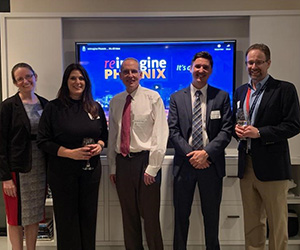College Personalizes Donor Relations
Prospective and current donors gathered at the house of Julia and Michael Fallon, MD, to learn more about the University of Arizona College of Medicine – Phoenix, meet faculty members and hear about the vision of creating a fibrosis research center.
The grassroots approach, which is new for the College of Medicine – Phoenix, is meant to personalize donor relations. The first Living Room Social took place Nov. 14.
“The broad goal of the living room social is to introduce the exciting things happening at the College of Medicine – Phoenix and Banner – University Medical Center to our community at a personal level,” said Dr. Fallon, chair of the Department of Medicine. “This was a grassroots effort to bring together friends, neighbors, colleagues and supporters for an informal event to describe specific programs that we think are critical to improving care.”

“This was a great way for people to come together in a casual environment to learn about fibrosis, meet experts and get to know our physicians and scientists on a very personal level,” said Liz Kaplan, senior director of Development.
The primary goal is to highlight innovative research by faculty members at the College of Medicine – Phoenix and Tucson that focuses on preventing organ failure and reversing end-stage disease. The ultimate goal is to create a fibrosis research center.
“We want to let the community know that we are here and are interested in solving some of the most important problems of our time through programs that are worthy of philanthropic support moving forward,” Dr. Fallon said.
Dr. Fallon described fibrosis as scarring. When diseases occur, organs become inflamed and the damage leads to a wound healing response that includes scarring. However, when damage persists, fibrosis continues, resulting in end-stage organ diseases such as heart failure, cirrhosis, lung diseases and kidney failure.
“The consequence of excess scarring underlies every major disease,” Dr. Fallon said. “It is the event that drives all organ failure that we see. Over the last 30 years, I have seen first-hand the devastating effects end-stage organ failure has on patients and families. It’s an incredibly difficult journey. This is why we are very excited about moving upstream with this research, so we can help find ways to stop the problem.”
Six faculty members presented during the evening including Louise Hecker, PhD, who discussed fibrosis and novel therapies to reverse fibrotic disease; Taben Hale, PhD, who explained her research in cardiac fibroblasts and the impact of fibrosis on heart function; Tim Marlowe, PhD, who shared his view from a chemist’s perspective and his research in targeting focal adhesion kinase (FAK) in fibrosis, and Ken Knox, MD, who discussed clinics that serve these patients and his lung-on-a-leaf research, which is a platform for disease modeling and discovery. Guests also heard from Guy Reed, MD, MS, dean of the U of A College of Medicine – Phoenix, who shared the vision of the campus and provided a medical school overview, and Dr. Fallon, who provided an overview of the event and explained the importance of working together to support a fibrosis research center.
The next Living Room Social is scheduled for Feb. 26, 2020, at the home of Shauna and Jochen Gliss, who are not affiliated with the College of Medicine – Phoenix, but are interested supporters.
“We started this grassroots effort in our own home, but our overall goal is to expand out to other individuals who are not connected directly with the medical school,” Dr. Fallon said. “This is a broad way to engage and excite people about what we are doing in Phoenix.”
If you are interested in learning more about the Living Room Social or donating to the College of Medicine – Phoenix, please contact Liz Kaplan.
About the College
Founded in 2007, the University of Arizona College of Medicine – Phoenix inspires and trains exemplary physicians, scientists and leaders to advance its core missions in education, research, clinical care and service to communities across Arizona. The college’s strength lies in our collaborations and partnerships with clinical affiliates, community organizations and industry sponsors. With our primary affiliate, Banner Health, we are recognized as the premier academic medical center in Phoenix. As an anchor institution of the Phoenix Bioscience Core, the college is home to signature research programs in neurosciences, cardiopulmonary diseases, immunology, informatics and metabolism. These focus areas uniquely position us to drive biomedical research and bolster economic development in the region.
As an urban institution with strong roots in rural and tribal health, the college has graduated more than 1,000 physicians and matriculates 130 students each year. Greater than 60% of matriculating students are from Arizona and many continue training at our GME sponsored residency programs, ultimately pursuing local academic and community-based opportunities. While our traditional four-year program continues to thrive, we will launch our recently approved accelerated three-year medical student curriculum with exclusive focus on primary care. This program is designed to further enhance workforce retention needs across Arizona.
The college has embarked on our strategic plan for 2025 to 2030. Learn more.